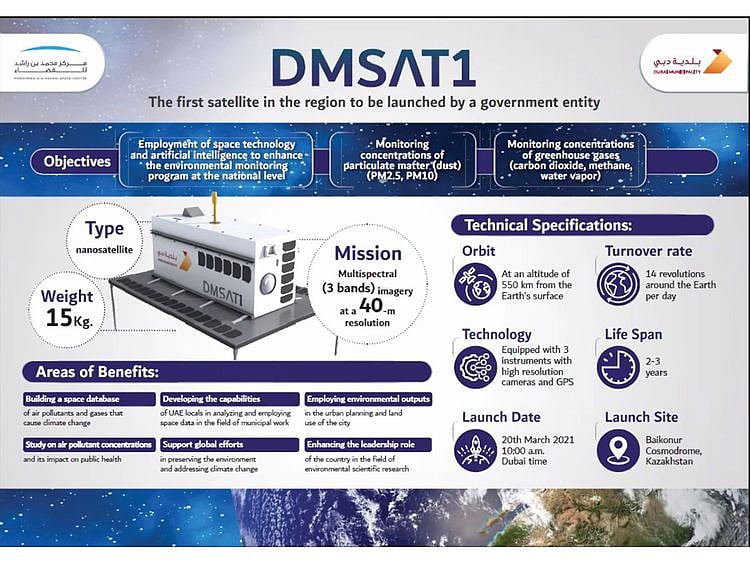Dubai’s environmental satellite DMSat-1 to lift off on Monday
Russian-made rocket will carry DMSat-1 and 37 other satellites from 17 other countries

Also In This Package
Dubai: After two cancellations, DMSat-1, Dubai Municipality’ first nanometric environmental satellite, will be launched on Monday, March 22, at 10.07am (UAE time), the civic body has tweeted on Sunday.
The Russian-made Soyuz-2a.1 rocket that will carry DMSat-1 and 37 other satellites from 17 other countries was supposed to lift off on Saturday but was postponed “due to a problem with the rocket’s upper stage”.
Russian Space Agency, Roscosmos, first rescheduled the launch on Sunday, March 21, but was also scrubbed. Roscosmos announced on its website: “After hearing the reports of the work supervisors, the members of the commission decided to launch the launch on the morning of Monday, March 22, 2021.”
Dubai Municipality and Mohammed Bin Rashid Space Centre also confirmed the new launch date in separate tweets on Sunday: “DMSat-1, the first nanometric environmental satellite for Dubai Municipality in collaboration with MBRSC, will be launched tomorrow at 10.07am (UAE time).”
Rocket payload
DMSat-1 will be launched from Baikonur Cosmodrome in Kazakhstan aboard a Russian-made Soyuz 2.1a rocket that will carry the main payload — a 500kg CAS500-1 remote sensing Earth observation satellite for the Korea Aerospace Research Institute (KARI), as well as smaller payloads for UK, Russia, Japan, Italy, Netherlands, Germany, Canada, Thailand, Spain, Slovakia, Argentina, Israel, Brazil, Hungary, Tunisia and Saudi Arabia.
The Russian-made launch rocket has been given a white and blue livery to mark 60 years since the launch of cosmonaut Yuri Gagarin, who became the first human to walk in space on April 12, 1961.
What DMSat-1 will do
According to Dubai Municipality, DMSat-1 is not only the region’s first low-orbit environmental satellite but is also the UAE’s contribution in combating global climate change. It will study the phenomenon of sandstorms in the UAE and the wider region and will be also be used to detect greenhouse gases to support environmental research and climate change related studies.
DMSat-1, a collaboration between Dubai Municipality and MBRSC, was built by engineers at Space Flight Laboratory (SFL) at the University of Toronto. It will be the fourth satellite in orbit that will be operated by MBRSC, after DubaiSat 2, KhalifaSat and Hope Probe.
MBRSC will manage the gathering and delivery of data generated by the project for Dubai Municipality. The data will then be shared with academic institutions inside and outside the UAE as part of data-sharing with other countries, in compliance with the Paris Agreement.
Satellite specifications
DMSat-1, which weighs only 15kg and has a dimension of 20x30x40 cm with a solar panel spanning 50cm, is a high-performance nanosatellite designed to perform multispectral observations. It has three scientific instruments, including multispectral polarimeter used to monitor air quality and detect fine particles in the atmosphere and a pair of spectrometers that will be used to detect greenhouse gases (carbon dioxide and methane).
The multispectral polarimeter, in particular, is a relatively new technology used by few space missions. It is used for remote sensing to collect improved characterisation of atmospheric aerosol. DMSat-1’s polarimeter will monitor and measure air pollutant, develop an air quality map, study seasonal changes and levels of air pollutants, and study the sources of air pollutants.
Sign up for the Daily Briefing
Get the latest news and updates straight to your inbox
Network Links
GN StoreDownload our app
© Al Nisr Publishing LLC 2026. All rights reserved.